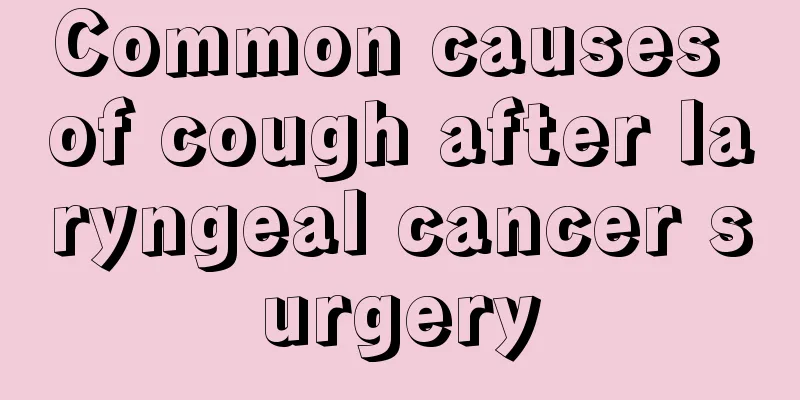Common causes of cough after laryngeal cancer surgery

|
Patients with laryngeal cancer may also experience a series of complications after surgery to remove the tumor. Coughing is one of the common symptoms. Frequent coughing is not conducive to wound healing and can also disturb the patient's mood. There are three main factors that cause patients to cough frequently after surgery. 1. Respiratory secretion factors Tracheotomy and fistula after laryngeal cancer surgery changes the integrity of the normal respiratory tract, the function of the respiratory mucociliary membrane changes, and the secretions increase. In the early postoperative period, patients are afraid to forcefully sputum due to wound pain and other factors. Sputum accumulates and forms scabs, which irritates the tracheal wall and causes coughing. Obvious sputum sounds or noises inside the cannula can also be heard. 2. Tracheal tube factors After tracheotomy, patients often feel uncomfortable when wearing the cannula for the first time, which causes some irritation to the trachea and causes irritating dry cough. Some cases are caused by the cannula being too large or too curved, causing the distal end of the cannula to collide with the anterior wall of the trachea, which causes coughing. The main manifestations are induced or postural coughs, often accompanied by blood in sputum. Severe coughs can sometimes be relieved by replacing the appropriate cannula or adjusting the tightness of the cannula tie. 3. Mucosal incision suture During vertical hemi-laryngectomy and middle laryngectomy, due to surgical interference, mucosal edema, inflammatory reaction, etc., the mucosal sense reaction is slow, saliva swallowing is difficult, and it is easy to cause aspiration, and choking and coughing are inevitable. In more obvious cases, there is an itchy feeling in the throat and a foreign body sensation. Mucosal trauma and absorption of thread head stimulation can also cause patients to cough violently. In this case, patients should try not to cough vigorously to avoid affecting wound healing. They should follow the doctor's advice to use appropriate antitussive drugs to control coughing. |
<<: What are the early symptoms of female brain cancer patients
>>: How to deal with anxiety in patients with brain cancer
Recommend
What are the differences between mental illness and neurosis?
Mental illness is an increasingly serious problem...
How to provide psychological care for patients with testicular cancer
We all know that testicular cancer is a very seri...
Is there any benign osteosarcoma
All osteosarcomas are malignant. Osteosarcoma is ...
How to wash off printer ink on clothes
Oil stains on clothes are a common phenomenon in ...
Listed as a Class 1 carcinogen by the WHO? It is very common on the dining table. It is recommended to eat less or not eat it
Today, I'm going to tell you a true story tha...
How serious is mid- to late-stage uterine cancer
Due to the lack of understanding of cervical canc...
Is it true that tetracycline tablets can cure acne?
Acne is a common skin problem, and it is also the...
What eating habits are undesirable
Pay attention to the life span that is eaten, sev...
Is occult blood in urine routine test 20 serious?
Urinalysis occult blood 20 is actually a kind of ...
What is pancreatic cancer? Is there any way to prevent it?
Pancreatic cancer is a highly malignant, difficul...
Can you eat fresh walnut skins?
Many friends have never seen what fresh walnuts l...
The difference between thyroid cancer and laryngeal cancer
Although both thyroid cancer and laryngeal cancer...
Is it normal to vomit due to kidney stones?
Patients with kidney stones sometimes experience ...
What are the early symptoms of lung cancer patients? Introduction to the early clinical symptoms of lung cancer
Polymyositis is one of the early symptoms of lung...
Why does my throat hurt after swimming?
When the weather is hot, people want to find some...









